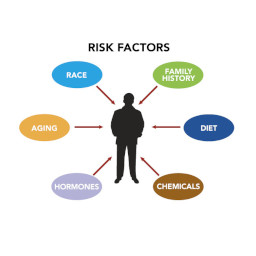Prostate cancer is not clearly linked to any preventable causes. Your risk of developing it depends on many things. These include age and ethnicity.
Anything that can increase your risk is called a risk factor. But having a risk factor doesn’t mean that you will definitely develop prostate cancer.
Age
Prostate cancer is more common in older men. Prostate cancer is most common in men aged 75 to 79 years.
1 in 6 men in the UK will get prostate cancer at some point in their lives.
Ethnicity
Prostate cancer is more common in black-African men than white men. It is least common in Asian men.
Family history and genes
Your risk of prostate cancer is higher if you have a close relative, such as a brother or father, who has had prostate cancer.
Some inherited genes can increase your risk of prostate cancer. These inherited genes are rare and account for only a small number of prostate cancers.
The risk increases by up to 5 times in men with the gene BRCA2. And the risk might increase with the BRCA1 gene. These genes also cause breast and ovarian cancers.
Men with a rare syndrome called Lynch syndrome have a higher chance of developing prostate cancer and some other cancers. A change in one of the genes that fixes mistakes in DNA causes this syndrome eg. MSH2 and MLH1 genes.
Researchers are looking into other genes that might also increase the risk of prostate cancer.
Being overweight or obese
Obese means being very overweight with a body mass index (BMI) of 30 or higher. And being overweight means having a BMI of between 25 and 30.
Try to keep a healthy weight by being physically active and eating a healthy, balanced diet.
There is some evidence that being active might help to lower your risk of developing prostate cancer.
Being overweight or obese increases your risk of advanced prostate cancer. Researchers have found a link between being obese or overweight and cancers being higher grade (faster growing).
Hormone levels
Hormone levels may play a part in the risk of developing prostate cancer. Insulin like growth factor (IGF-1) is a hormone our body makes. It regulates normal cell growth and death.
Some studies have found that there is a higher risk of prostate cancer when there is a high level of IGF-1 in the body. A high level of IGF-1 doesn’t cause symptoms in men.
Information copied from: https://www.cancerresearchuk.org/about-cancer/prostate-cancer/risks-causes

